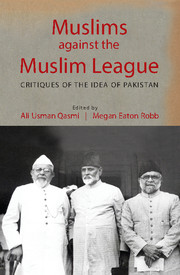Book contents
- Frontmatter
- Contents
- Acknowledgements
- Introduction
- 1 Maulana Husain Ahmad Madani and the Jami'at ‘Ulama-i- Hind: Against Pakistan, against the Muslim League
- 2 The Partition Conundrum: Perspectives, Experiences and Ambiguities from qasbahs in India
- 3 Choudhary Rahmat Ali and his Political Imagination: Pak Plan and the Continent of Dinia
- 4 Differentiating between Pakistan and Napak-istan: Maulana Abul Ala Maududi's Critique of the Muslim League and Muhammad Ali Jinnah
- 5 Advising the Army of Allah: Ashraf Ali Thanawi's Critique of the Muslim League
- 6 The Illusory Promise of Freedom: Mian Iftikhar-ud-Din and the Movement for Pakistan
- 7 Visionary of Another Politics: Inayatullah Khan ‘al-Mashriqi’ and Pakistan
- 8 Nonviolence, Pukhtunwali and Decolonization: Abdul Ghaffar Khan and the Khuda'i Khidmatgar Politics of Friendship
- 9 Islam, Communism and the Search for a Fiction
- 10 Muslim Nationalist or Nationalist Muslim? Allah Bakhsh Soomro and Muslim Politics in 1930s and 1940s Sindh
- 11 Dancing with the Enemy: Sikander Hayat Khan, Jinnah and the Vexed Question of ‘Pakistan’ in a Punjabi Unionist Context
- 12 Religion between Region and Nation: Rezaul Karim, Bengal, and Muslim Politics at the End of Empire
- 13 ‘The Pakistan that is going to be Sunnistan’: Indian Shi'a Responses to the Pakistan Movement
- 14 The Baluch Qaum of Kalat State: Challenging the Ideological and Territorial Boundaries of Pakistan
- Contributors
- Index
11 - Dancing with the Enemy: Sikander Hayat Khan, Jinnah and the Vexed Question of ‘Pakistan’ in a Punjabi Unionist Context
Published online by Cambridge University Press: 28 February 2018
- Frontmatter
- Contents
- Acknowledgements
- Introduction
- 1 Maulana Husain Ahmad Madani and the Jami'at ‘Ulama-i- Hind: Against Pakistan, against the Muslim League
- 2 The Partition Conundrum: Perspectives, Experiences and Ambiguities from qasbahs in India
- 3 Choudhary Rahmat Ali and his Political Imagination: Pak Plan and the Continent of Dinia
- 4 Differentiating between Pakistan and Napak-istan: Maulana Abul Ala Maududi's Critique of the Muslim League and Muhammad Ali Jinnah
- 5 Advising the Army of Allah: Ashraf Ali Thanawi's Critique of the Muslim League
- 6 The Illusory Promise of Freedom: Mian Iftikhar-ud-Din and the Movement for Pakistan
- 7 Visionary of Another Politics: Inayatullah Khan ‘al-Mashriqi’ and Pakistan
- 8 Nonviolence, Pukhtunwali and Decolonization: Abdul Ghaffar Khan and the Khuda'i Khidmatgar Politics of Friendship
- 9 Islam, Communism and the Search for a Fiction
- 10 Muslim Nationalist or Nationalist Muslim? Allah Bakhsh Soomro and Muslim Politics in 1930s and 1940s Sindh
- 11 Dancing with the Enemy: Sikander Hayat Khan, Jinnah and the Vexed Question of ‘Pakistan’ in a Punjabi Unionist Context
- 12 Religion between Region and Nation: Rezaul Karim, Bengal, and Muslim Politics at the End of Empire
- 13 ‘The Pakistan that is going to be Sunnistan’: Indian Shi'a Responses to the Pakistan Movement
- 14 The Baluch Qaum of Kalat State: Challenging the Ideological and Territorial Boundaries of Pakistan
- Contributors
- Index
Summary
This article explores the uneasy alliance between Sikander Hayat Khan, the last-but-one premier of undivided Punjab, and Muhammad Ali Jinnah. Signed at the zenith of Unionist glory, the Sikander–Jinnah pact begs several questions. Why did Sikander sign the pact in the first place? What did he want for the future of the Punjab, and how could Jinnah have been of use to him in attaining these goals? What were Sikander's thoughts on Jinnah's ambiguous ‘Pakistan’? And perhaps most important of all, why did he refuse to end the pact even though it increasingly became a cause of embarrassment and inconvenience for him?
In seeking answers to these questions, the article challenges some major assumptions about League–Unionist dynamics in historiography. For one, Jinnah's position in the Punjab, especially after the signing of the pact, was not as tenuous as it is generally made out to be. It follows, then, that the process of decolonization was perhaps more unsettling for the landed elites than is generally acknowledged. A third theme which emerges from this work concerns the lack of importance generally accorded to Sikander's various federal proposals. While these schemes did not bring Sikander any closer to achieving his goals, they nevertheless offer the clearest insight into what he wanted for the future of the Punjab. This, in itself, is interesting and significant given the uncertainty enveloping the Raj's fate and Jinnah's intentions.
Background
The Punjab National Unionist Party, a cross-communal party of landlords, won a sweeping victory in the elections of 1937, and proceeded to form the provincial government. Several independents and the Sikh Khalsa National Board decided to coalesce with the winning party afterwards. The Congress emerged the strongest party in the opposition. The Punjab Muslim League won two seats, of which one (Raja Ghazanfer Ali) switched to the Unionist Party after the election. As head of the Unionists, Sikander became the new premier of the Punjab. His cabinet included Chottu Ram, a Hindu Jat championing the cause of landlords, and Mian Abdul Hye, an urban Muslim. In addition, Sunder Singh Majithia was included as the Sikh representative, while Manohar Lal was to represent the urban Hindu community. Khizr Tiwana was made a minister as well, in order to maintain the balance between the two main factions amongst Muslim landowners (i.e. the Hayat-Daultana faction and the Noon-Tiwana faction).
- Type
- Chapter
- Information
- Muslims against the Muslim LeagueCritiques of the Idea of Pakistan, pp. 311 - 337Publisher: Cambridge University PressPrint publication year: 2017
- 1
- Cited by



